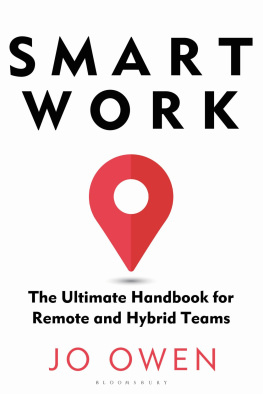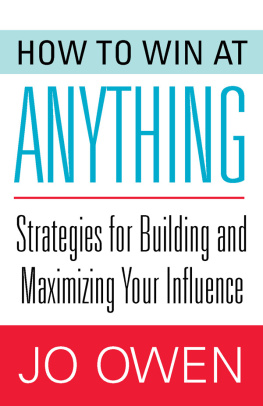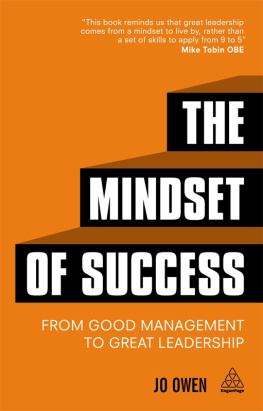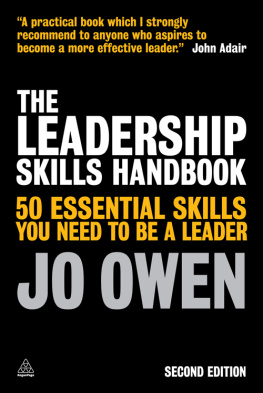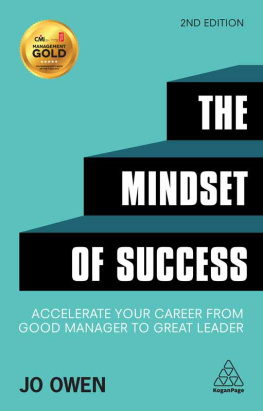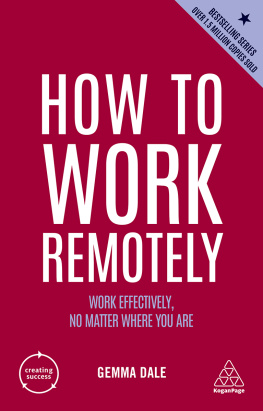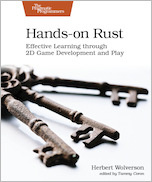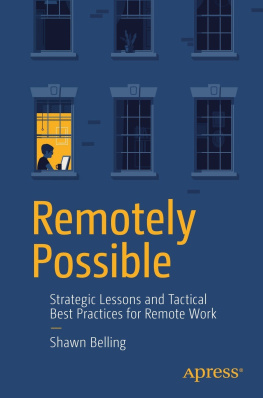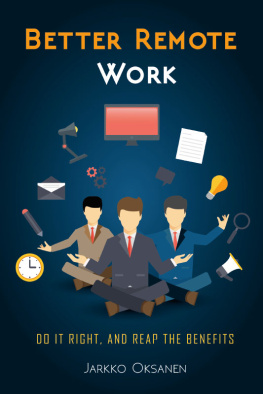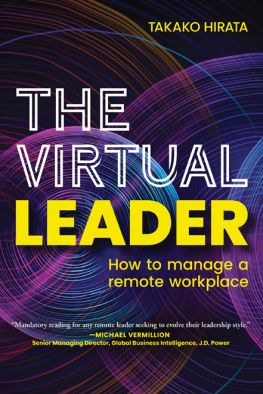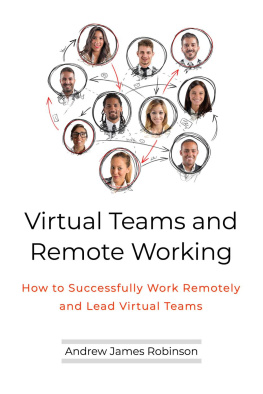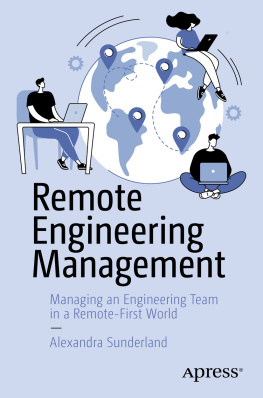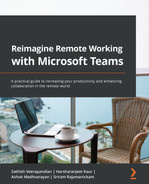A treasure trove of ideas for the new working world.
Jo Youle, Chief Executive, Missing People
A masterful and stimulating read. A practical book full of ideas for modern leaders who embrace the change.
Gosia Walendzik, Founder, Medica Assistance
In this excellent book on leadership, Jo brings a lifetime of work and his trademark pragmatism to one of the most important issues for all leaders today how to help their teams be the best they can be while working remotely.
David Stephen, Group Chief Risk Officer, Westpac
Smart Work combines powerful insights into some of the factors that have led teams and organizations to thrive, struggle, or both through realities of the pandemic, with provocations for how we can learn from this time to harness the power of what weve realised is now possible.
Emily Preston, Senior Project Lead, Innovation Unit
The new era of hybrid working has just begun: in this book, you can already find effective solutions to stay ahead of the game in the next years.
Marco Maccari, Head of HR Talent & Rewards, Fater

Contents
This book was a huge team effort. I would like to thank Ian Hallsworth and the team at Bloomsbury for taking on this project and for Ians sound guidance throughout; Jason Bartholomew made the right things happen as my agent; and Mark Bowden was a helpful genius on body language. Steve Chase and the team at idAudio worked magic to help me turn the written word into the spoken word and the audiobook version of Smart Work .
So many people contributed their time and insight to this book it is impossible to recognize them all, but I would like to mention the following who went out of their way to help: Omar Al-Farsi, Sandie Bakowski, Patrick Brady, Adrian Dougherty, Vicky Grinnell-Wright, Russell Hobby, Patricia Lajara, Marco Maccari, Debra Medhurst, Luke Morini, Yasmine Morrison, Ilias Papakonstantinou, Ben Peachey, Emily Preston, Ken Rauch, Jane Royden, David Stephen, Magdalena Walawska-Nowak, Gosia Walendzik, Crispin White and Jo Youle.
Anyone who has enjoyed the doubtful delights of lockdown will know the vital importance of a supportive partner, and I am eternally grateful to my wife Hiromi for her support, endurance and understanding.
Appropriately, Smart Work has been created entirely remotely. I am hugely grateful to everyone who made it happen. And if there are any failings, they are all mine. Finally, my thanks to you for reading the book. I hope you find it useful and even enjoyable.
I started work on this book, by accident, nearly 20 years ago. When we started Teach First, which is now the UKs largest graduate recruiter, we had to develop a leadership programme at zero cost because we had no money. Suddenly, I had to find out what leadership was all about. Since then, I have been exploring leadership in every context, industry and continent. I have worked with over 100 of the best, and a couple of the worst, organizations on our planet. The research has taken in global businesses, micro-businesses, entrepreneurs, NGOs, sports teams, explorers and special forces. I have spent more time than is wise exploring how traditional societies lead and manage themselves. I have even seen how the nuclear deterrent at sea is managed.
The original research for this book included revisiting many of the organizations I had worked with or studied before. In every case, it was clear that the coronavirus pandemic has been a game changer.
The result is a book deliberately short on theory. It focuses on what is working in practice around the world and in hugely varied organizations. This book outlines best practice on all the practical challenges of Smart Work, and shows how you can design a solution tailor-made to your needs. It explores:
How to split time and work between home and office.
How to communicate and co-ordinate remotely.
How to build the correct IT structure to support remote working.
How to have effective meetings.
How to manage time and workloads.
How to sustain intrinsic motivation when working remotely.
How to deal with stress and burnout.
How to achieve some work-life balance.
How to manage the conflicting needs of different employees and different types of work: not all work and not all staff are suited to hybrid or remote working.
Changing office routines, technology and operations is relatively simple. Changing skills and styles of leadership is far harder. This book will show you how and why leadership and management is changing in the world of hybrid teams. It will also show you how you can turn risk into opportunity: you will discover how you can thrive in the new world of twenty-first-century leadership and work.
The original research for this book was both global and, appropriately, remote. The challenges and solutions from around the world, across industries and from small to large firms, varied hugely in detail. But they all fitted into a broad and consistent framework: RAMP.
RAMP stands for:
1. Relationships: build networks of trust and support to make things happen.
2. Autonomy and accountability to drive action.
3. Motivation, mental health and mastery to sustain peak performance.
4. Process: fix the plumbing of remote working.
RAMP shows how you can rise to the challenge of hybrid working as a leader, manager or team member. Smart Work is organized into four chapters covering each element of RAMP.
1Relationships: build networks of trust and support to make things happen
During the early stages of the pandemic, the loss of face-to-face relationships helped us discover how much we value them. This matters for morale, motivation and effectiveness. No one can succeed alone. You have to make things happen through other people. You need your networks of trust, support and influence. In the office, you can build these networks naturally through the endless spontaneous chats which happen every day. Working remotely, it is much harder to build those networks of trust and support. Many people have found that they succeeded because they were able to draw on their existing pool of trust and support, forged when everyone was in the office together. But the longer teams stay remote, the more that trust starts to fray. New team members in particular find it hard to build the relationships they need to succeed.
No one can succeed alone
Leaders and team members face the same challenge: how do I build and maintain my network of trust and support? For leaders, the challenge is particularly acute: remote working requires far more trust than working in the office. In the office you can see who is doing what. Even if you are not a micromanager, you can stay in control simply by looking and listening. When your team is working remotely, you do not even know what they are wearing beneath the waistline. You cannot really tell how hard they are working. You have to trust them to do the right things while you are not watching. It is a huge test of trust for the leader and of values for the team member.
Fortunately, you can learn how to build networks of trust and support. The four keys to trust are:
Align goals . It is hard to trust someone who has conflicting goals. Teams only work well when they have a common goal.
Align values . It is far easier to trust someone who shares similar values, experiences, ways of communicating and thinking. Getting to know colleagues is not a waste of time; it is an investment of time in building trust.

